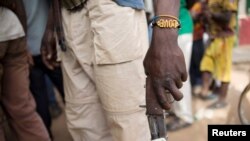Hundreds of civilians are seeking refuge inside a mosque in the Central African Republic's border town of Bangassou amid ongoing attacks by Christian militias that have killed up to 30 civilians, U.N. officials and aid workers said on Sunday.
The attacks throughout the weekend on the town of Bangassou on the Congolese border have involved hundreds of fighters with heavy weaponry and appeared to be aimed at Muslims, they said, in the latest sign that the multi-year conflict is worsening.
The U.N. base there has also been targeted, prompting the deployment of extra troops to the remote town on Sunday in anticipation of further attacks. They had succeeded in partly securing the town by dusk, said Herve Verhoosel, spokesman for the U.N. mission (MINUSCA).
"The situation is extremely deplorable and we are doing everything to rapidly retake control of Bangassou," MINUSCA chief Parfait Onanga-Anyanga told Reuters in an interview.
Asked about the civilian death toll, he added: "It is clear that we are looking at numbers that could easily reach 20 to 30." Many of the fighters are child soldiers who appeared to be under the influence of drugs, he added.
Local Red Cross President Pastor Antoine Mbao Bogo said gunfire continued to ring out from the town on Sunday, blocking attempts by his organization and others to reach the wounded and recover the dead.
In recent months, roaming militias spurred by ethnic and religious rivalries have stepped up violence despite pledges to take part in a government-led disarmament program.
Aid workers say that militias seem to be exploiting security voids after Ugandan and French soldiers left in the past few months when their missions ended.
U.N. Secretary General Antonio Guterres said on Sunday he was "outraged" by the attacks on the 13,000-strong mission that have killed six peacekeepers around Bangassou, an area previously sheltered from conflict.
Prime Minister Simplice Sarandji condemned the attacks in a statement on local radio on Sunday and said those responsible would be brought to justice.
Central African Republic has been plagued by inter-religious violence since 2013 when mainly Muslim Seleka fighters seized power and ousted then-President Francois Bozize, prompting reprisal killings from anti-balaka militias drawn from the Christian minority.
More than 400,000 people in the former French colony are displaced internally and 2.2 million, or nearly half the population, are reliant on aid.





